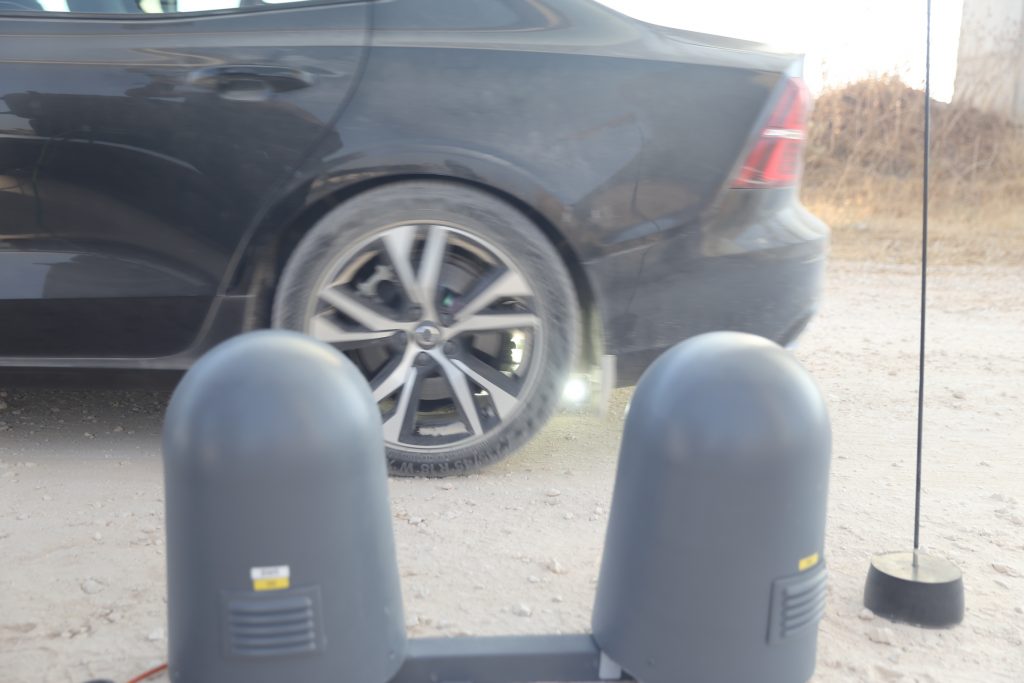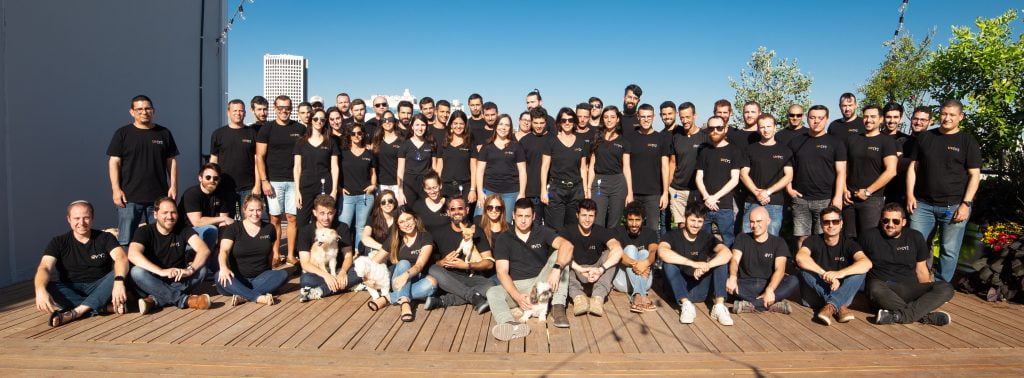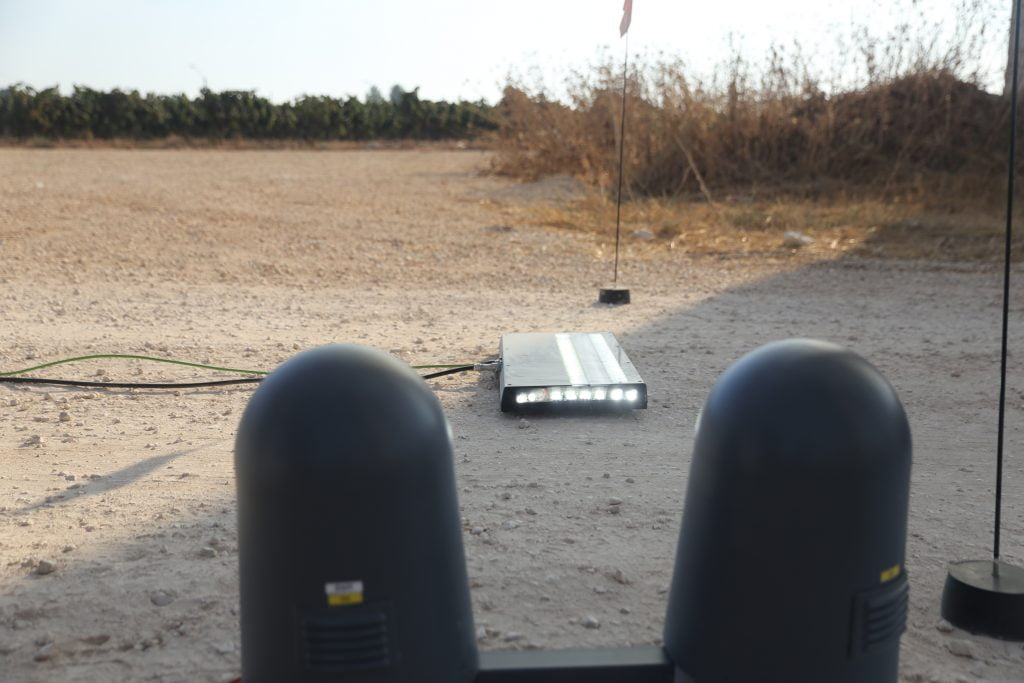The prestigious International Motor Show (IAA) in Frankfurt, Germany is known for drawing the biggest names in mobility to its stages. Earlier this month at the annual event, a new tire inspection system called Artemis by Israeli company UVeye, was one of the tech solutions generating high interest from the industry.
Founded in 2016, UVeye develops “smart” vehicle inspection systems, promising to “dramatically change” how automakers, major fleet operators and dealerships inspect vehicles. The startup, whose tech was initially
developed to detect bombs and weapons, says it relies on proprietary cloud architecture, sensor fusion, machine learning, and smart algorithms to automatically check components, bodywork and tires. The Artemis, for example, checks for tire wear and quality, including tire pressure, tread wear and sidewall flaws.
SEE ALSO: Ride & Fly: US-Israeli Startup To Begin Testing Flying Vehicle In 2020
And major players in the car and mobility industries have taken notice. This summer, UVeye raised $31 million in a funding round led by Toyota Tsusho, the trading arm of the Toyota Group, Volvo Cars and W. R. Berkley Corporation, an American insurance company. Skoda and Daimler are also strategic partners.

UVeye CEO Amir Hever said in a press statement late last month that these partnerships, “as well as ongoing discussions with more than 20 other strategic manufacturers and suppliers, show that the market is very interested in our technology.”
“With Artemis, we have taken a step further towards standardizing the automatic external inspection of vehicles based on artificial intelligence and deep learning,” he said.
Israel – a driving force in the auto industry
Israel’s name in the auto industry is exceptional. There’s a long list of mobility technologies in need in the global auto industry – and Israel is taking part in the innovation.
With increasing automotive production worldwide and government regulations on vehicles new and old, the vehicle inspection market is showing a real need for improvement.
Artemis is actually the third inspection system in UVeye’s cache.
The Tel Aviv and Stamford-based company also produces Helios, an undercarriage application, and Atlas, a “360 solution” for scanning vehicles.
Vehicles drive over or through camera-laden constructs that together with artificial intelligence, algorithms and deep machine learning quickly identify anomalies, modifications and foreign objects on all sides of a vehicle in motion.
It’s hard to believe that a better solution for external inspection of vehicles didn’t exist before UVeye entered the market three years ago.

The company got its start following a real-life encounter between Hever and an Israeli security guard. He had pulled up in his car to a government facility in Israel and the guard approached to check the underbody of his vehicle for bombs. With a mirror attached to a pole.
Hever, a computer vision expert, couldn’t believe the inefficiency. Together with his brother, Ohad, an engineering hardware expert, they set out to create a better vehicle inspection system for the Homeland Security and Defense (HLS) market.
They founded UVeye and quickly culled customers in the security services sector in Israel, Europe, and Africa.
A year later, they expanded to develop quality-control technology for the entire auto industry.
Sign up for our free weekly newsletter
SubscribeFrom detecting bombs to inspecting tires
The company’s proprietary hardware combined with machine learning and computer-vision algorithms are what give it a leg up in the vehicle inspection market, Yaron Saghiv, VP Marketing, tells NoCamels.
“They started building undercarriage scanners with cameras and at the same time, they started developing an algorithm that could assist human beings and show them indications of potential threats. They trained an algorithm to detect things that shouldn’t be under the vehicle,” says Saghiv.
The brothers used a fleet of rental cars to teach the algorithm “what an ideal undercarriage of a vehicle” looks like. Anything that didn’t follow the standard was listed as an anomaly.

Today, UVeye’s technology is still used for its initial purpose to detect potential threats like weapons, explosives, and others.
“There are very big companies that tried for visual solutions to have better angles and taking pictures of the undercarriage. What helps us stand is that we started in the security market and aggregated a lot of data. The algorithm got smarter, it got to know a vehicle very well,” says Saghiv.
The auto industry as a whole, of course, could benefit from a technology that could detect potentially hazardous mechanical issues in a matter of seconds. The system is able to detect vehicle defects, including scratches, oil and rust leaks, as well as a comprehensive analysis of tires.
In Frankfurt this month, the company showcased Artemis, its targeted tire application, and Helios, the underbody scanner that vehicles drive over to find defects.
Tire-related deaths in the US, according to a 2019 report, are higher than those killed by distracted driving involving cell phones.
So, a new inspection solution focused on the tires couldn’t be more welcome.
Artemis has tire scanners that stand at the side of the vehicle. The car or truck drives past and within seconds, the system updates its condition, pressure, abrasion, and scratches.
The system is set to be used for the first time by bus fleet operator Kavim in Israel. And Volvo is planning to introduce Helios and Atlas inspection systems at manufacturing facilities and dealerships, according to a company statement.
Saghiv says other case studies with main car companies are underway but preferred not to name them.
“Right now we’re in scale mode. We are expecting to install our systems in many more sites including rental companies, bus fleet operators, insurance companies… in the next few months, expect to see much more of our system,” Saghiv tells NoCamels.
So far, UVeye says it has generated millions of vehicle scans in dozens of countries around the world.
Viva Sarah Press is a journalist and speaker. She writes and talks about the creativity and innovation taking place in Israel and beyond. www.vivaspress.com
Related posts

Editors’ & Readers’ Choice: 10 Favorite NoCamels Articles

Forward Facing: What Does The Future Hold For Israeli High-Tech?

Impact Innovation: Israeli Startups That Could Shape Our Future




Facebook comments